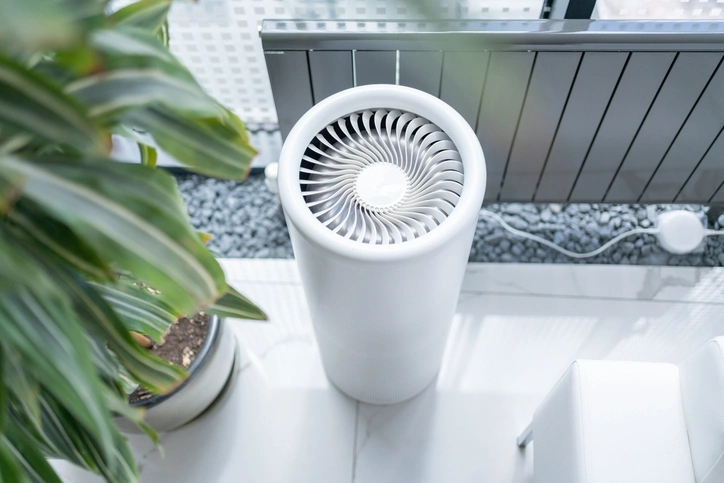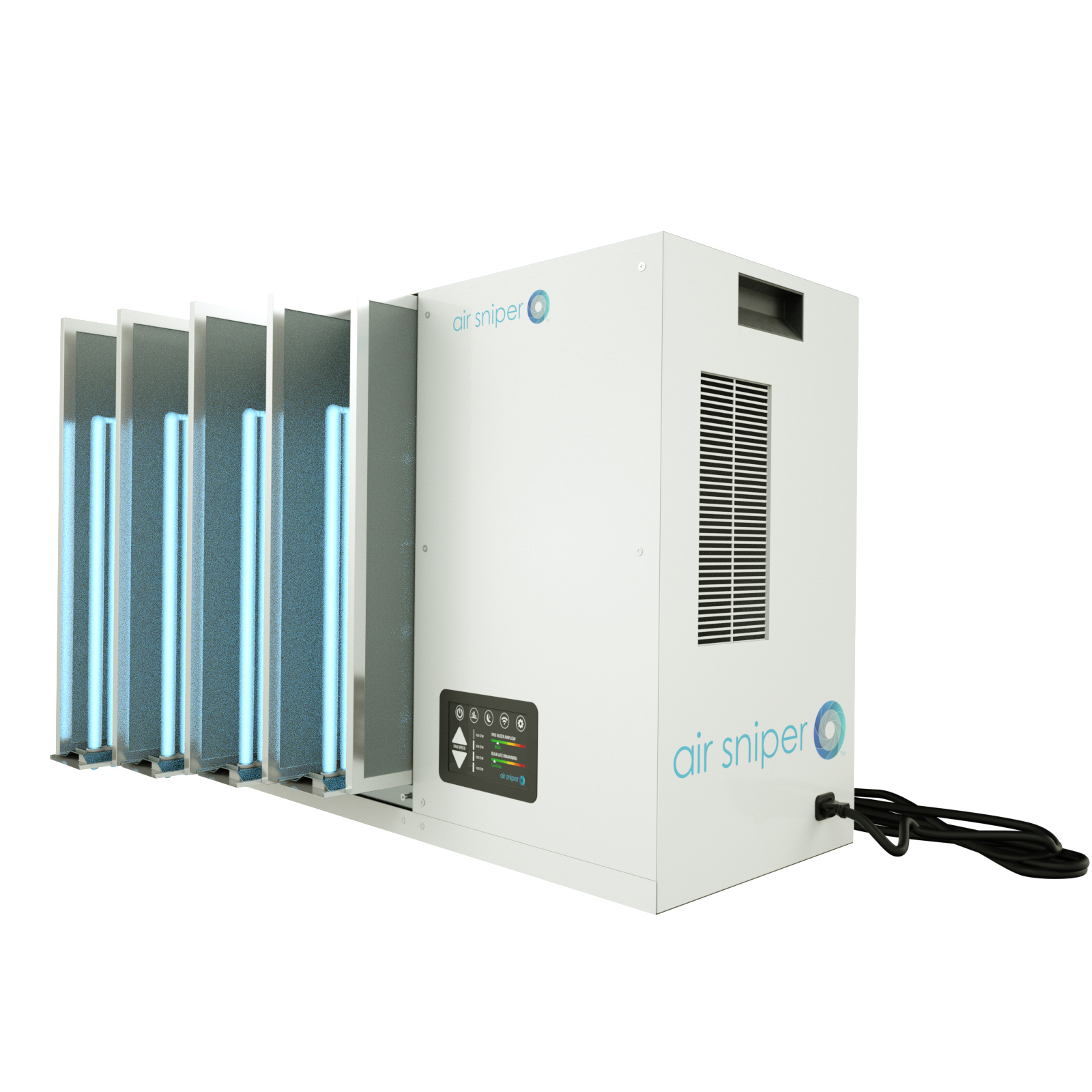When interpreting the English language, there are, perhaps unsurprisingly, many interpretations. Words that sound the same or seem to mean the same thing often get swapped out and used interchangeably, regardless of how close their definitions and meanings match the context of their use.
One such example of this is the difference between supplemental air sanitization, purification, and filtration. Three similar-sounding names that seem to indicate different things, but are they so different? Let’s take a look at the difference between an air purifier and an air sanitizer.
What is Air Sanitization?
Of the three, air sanitization is the most likely to stand a chance of differentiating itself. This is because sanitization, from the Latin sanitas (meaning health), actually indicates a specific level of cleanliness. The surface or area must be sanitized afterward. Air Sniper equipment does just that, rendering microorganisms and pathogens inert through a perfect mix of CFM and Dwell Time.
Benefits of air disinfection with specialized equipment:
- Improved air quality. Specialized air disinfection equipment removes or neutralizes airborne contaminants, including dust, pollen, mold spores, and other particulate matter, resulting in cleaner air.
- Reduction of allergens. By capturing and eliminating common allergens such as pet dander, dust mites, and pollen, these devices help reduce allergic reactions and symptoms.
- Control of pathogens. Air disinfection equipment, especially those utilizing UV-C light and HEPA filters, effectively kills or inactivates bacteria, viruses, and other microorganisms, lowering the risk of infections.
- Mitigation of odors. Activated carbon filters and other odor-reducing technologies remove unpleasant smells from the air, improving the overall indoor environment.
- Enhanced respiratory health. Reducing airborne pollutants helps alleviate respiratory conditions such as asthma, bronchitis, and other chronic respiratory issues, leading to easier breathing and better overall health.
- Prevention of mold growth. Air disinfection equipment helps control humidity and remove mold spores from the air, preventing mold growth and related health problems.
- Improved sleep quality. Cleaner air can lead to better sleep quality by reducing respiratory irritation and nighttime allergies, contributing to overall well-being.
- Enhanced productivity and comfort. A healthier indoor environment can lead to increased comfort and productivity, particularly in workplaces, schools, and other public spaces.
- Reduction of chemical pollutants. Some air disinfection systems, like those with activated carbon filters, remove volatile organic compounds (VOCs) and other chemical pollutants, reducing exposure to harmful substances.
- Long-term health benefits. Continuous use of air disinfection equipment can contribute to long-term health benefits by consistently reducing exposure to harmful airborne particles and pathogens.
- Energy efficiency. Modern air disinfection systems are designed to be energy-efficient, ensuring effective air purification without significantly increasing energy consumption.
Investing in specialized air disinfection equipment offers substantial benefits, from improving air quality and reducing allergens to enhancing respiratory health and overall well-being. These systems are particularly valuable in settings where air quality is critical, such as homes, healthcare facilities, schools, and workplaces.
The difference between air purifiers and air sanitizers is significant, so let’s look further at the features of air purification.
What is Air Purification?
The word purify traces its etymological roots back to Latin as well. The original word, purus, means pure. For something to be pure, it must not be mixed with other substances or materials. As air is always a composite of many different gases, purifying it seems a tall order indeed. Air purification systems typically include filters and fans, but not necessarily UVC sanitization. However, this doesn’t mean UVC can’t be an air purifier.
Pros of air purification systems:
- Improved air quality. Removes pollutants, allergens, and contaminants, ensuring cleaner indoor air.
- Health benefits. Reduces symptoms of allergies, asthma, and respiratory issues by eliminating airborne irritants.
- Pathogen control. Inactivates bacteria, viruses, and other microorganisms, reducing the risk of infections.
- Odor reduction. Eliminates unpleasant odors from pets, cooking, smoke, and more.
- Enhanced comfort. Creates a more comfortable living or working environment by reducing airborne particles and odors.
- Mold prevention. Helps control humidity and remove mold spores, preventing mold growth.
- Increased productivity. Cleaner air can improve concentration and productivity, especially in workplaces and schools.
- Energy efficiency. Modern systems are designed to be energy-efficient, providing effective purification without high energy costs.

When choosing an air purification system, start by identifying your specific needs. If you suffer from allergies, look for systems with HEPA filters, which are designed to capture allergens. For odors and chemicals, choose a system with activated carbon filters, while UV-C light or PCO technology is effective for pathogen control.
Next, consider the size of the room or area you need to purify and ensure the system’s capacity matches it. Evaluate the types of filters the system uses: HEPA filters are effective for particulate matter, activated carbon filters work well for odors and volatile organic compounds (VOCs), and combination systems offer multiple types of filtration for comprehensive purification.
Maintenance requirements are also important. Check how often filters need to be replaced and how easy it is to do so. Consider the noise level of the system, especially if it will be used in bedrooms or other quiet areas. Seek out energy-efficient models to reduce electricity expenses.
Cost is another factor to consider. Factor in both the initial purchase price and the ongoing maintenance costs, such as filter replacements. Research brands and read customer reviews to ensure you choose a reliable and effective system. Finally, consider additional features that may be important to you, such as air quality sensors, automatic mode, and remote control for added convenience.
When considering the difference between air purifiers and air sanitizers, it is also worth mentioning air filtration.
What is Air Filtration?
Air filtration seems the most self-evident of the three, for filter traces its origins back to the Latin filtrum, meaning felt used as a filter. This seems like a clear indication of the type of system at play here, such as HEPA filter systems.
Air filtration with special equipment involves using advanced devices to remove contaminants from the air, improving indoor air quality and promoting better health. These systems typically use a combination of filters and technologies to capture or neutralize pollutants such as dust, allergens, bacteria, viruses, odors, and chemical vapors.
Benefits of air filtration with special equipment:
- Health improvement. Reduces respiratory issues, allergies, and the spread of infectious diseases by removing harmful particles and pathogens from the air.
- Enhanced comfort. Eliminates odors and maintains a cleaner indoor environment, contributing to overall comfort and well-being.
- Mold and mildew prevention. Controls humidity and removes mold spores, reducing the risk of mold growth.
- Protection from chemical pollutants. Removes VOCs and other harmful chemical vapors, improving indoor air quality and reducing health risks.
Air filtration with special equipment is essential for maintaining clean and healthy indoor air. By understanding the various technologies and types of equipment available, individuals can choose the best system to meet their specific needs, whether for personal, residential, or commercial use.
Air Sanitizer vs. Air Purifier
As you can see, each of these phrases comes from a distinct root and with a distinct purpose. For that reason, it seems best to remove air filtration from the discussion. Still, when differentiating health and purity, it is a much harder decision.
Indeed, the words are so similar that separating them seems unnecessary. Instead, it is best to look at supplemental air sanitization and air purification systems from the same perspective. In this way, a higher standard can prevail and the safety of your business can be better secured.
Air Sniper provides supplementary air sanitization and purification systems that have proven results from independent, third-party testing results. To learn more about the products and which one is right for your business, request a quote from the helpful and courteous staff today at 1-888-338-9549. An expert will explain the difference between an air purifier and an air sanitizer and help with product selection.

